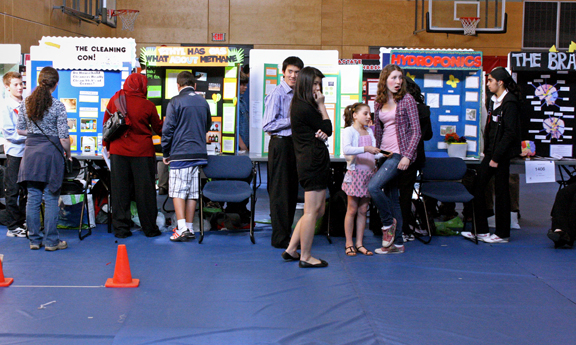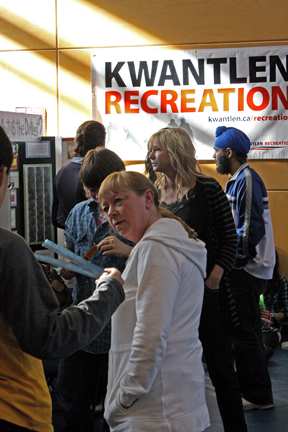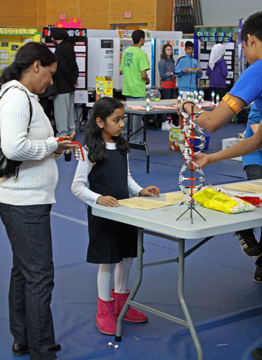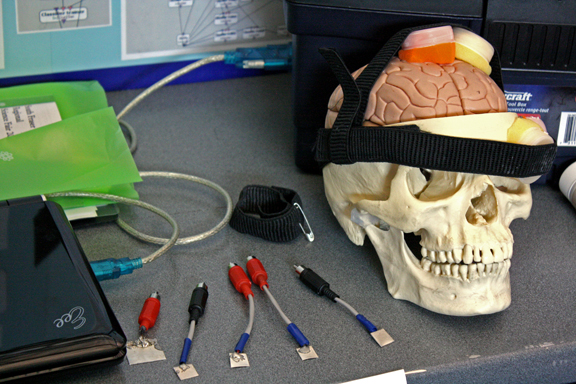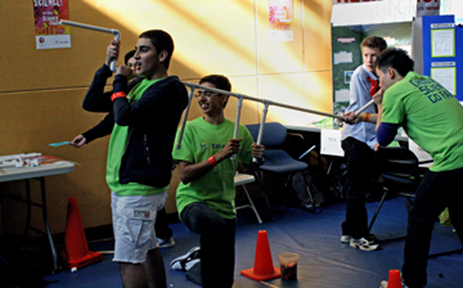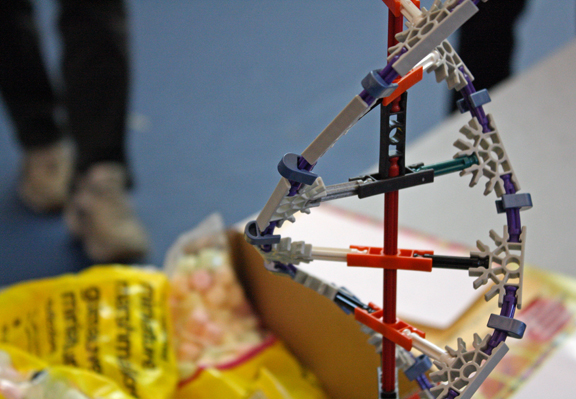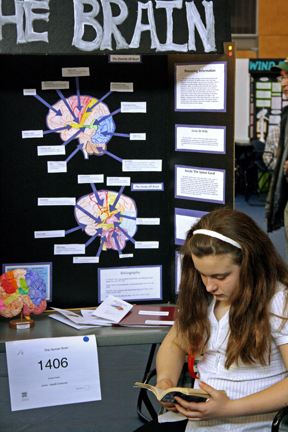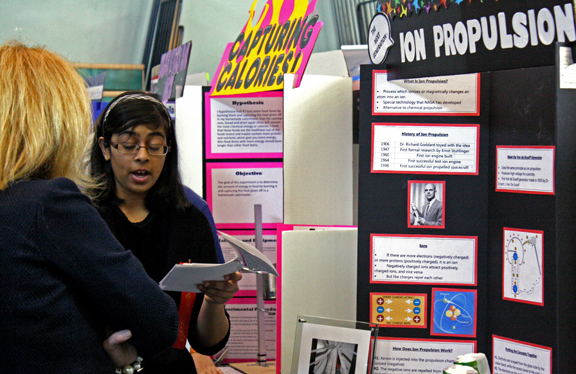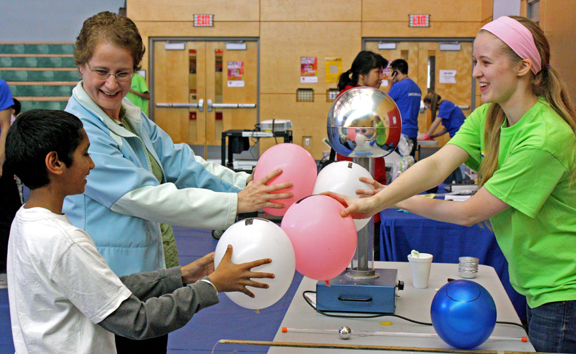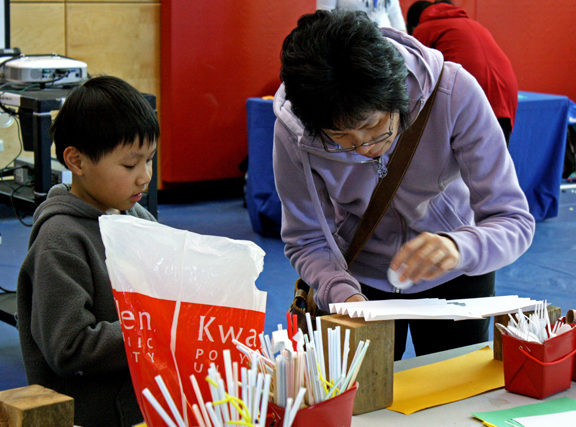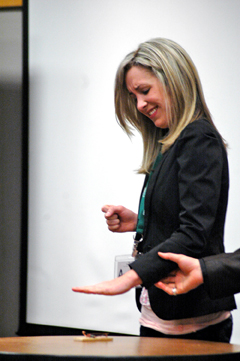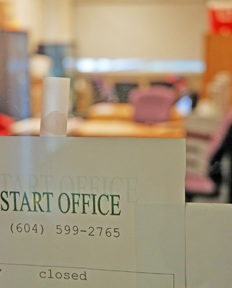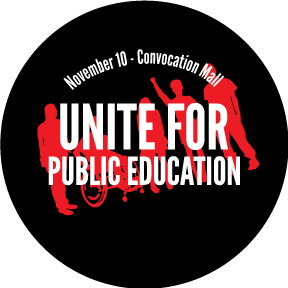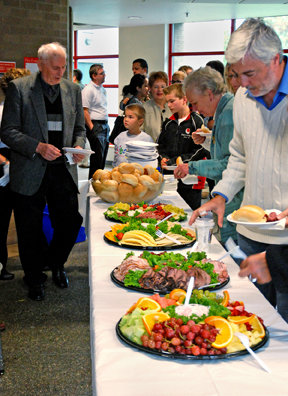Blinded by science
April 12, 2011 by Hayley Woodin · 1 Comment
Students from Grades 7-12 gathered at Kwantlen’s Surrey campus to display their science projects on Thursday and Friday.
The school hosted the South Fraser Regional Science Fair, which doubled as a chance for elementary and high school students to tour the campus and learn a little about the post-secondary institution. Over the course of the two-day event, students showcased their projects to judges, fellow students, family, community members and Kwantlen students.
The displays were classified as either an experiment, innovation or study. Projects studied mold growth, the human brain and wind energy, and included projects like one titled “Effects of Okra Mucilage on Non-Pathogenic Escherichia Coli Growth.”
Up to eight students from the fair will be awarded the opportunity to fly to Toronto to compete in the Canada-wide science fair, all expenses paid. The national competition runs from May 14-21, and the regional participants will be announced on Tuesday.
The winning students will have scored the highest marks after judges graded them on their oral presentations, the construction of their displays and the logic of their projects, among other things.
Credit cards: it’s no small change
March 9, 2011 by Hayley Woodin · Leave a Comment
If you fancy a bottle of Coke or a sugary snack but don’t have the cash, you can indulge your sweet tooth by adding a buck fifty to your credit card bill. Several vending machines throughout Kwantlen give students the option to swipe their VISA or Mastercard, but that’s a convenience students can’t use when it comes time to pay their tuition.
The school chose to end credit card payment for tuition beginning in the fall 2010 semester, explaining the transaction fees credit companies charge is “quite absorbent,” especially when thousands of students pay their tuition during the same period.
The university has stated that it expects to save $250,000. The money will go to students in the form of scholarships and bursaries.
Kwantlen isn’t the first post-secondary institution to implement the change. Both the University of British Columbia and Simon Fraser University have also stopped accepting credit cards as a method of tuition payment.
On the Kwantlen website, it states that the only things domestic students can’t pay with a credit card are tuition, student fees and KSA fees. Other fees and services are payable with credit.
According to the school, “you can use your VISA or Mastercard for the commitment fee but that’s as far as it goes.”
Eagles’ basketball coach cites personal reasons, resigns
February 7, 2011 by Hayley Woodin · 1 Comment
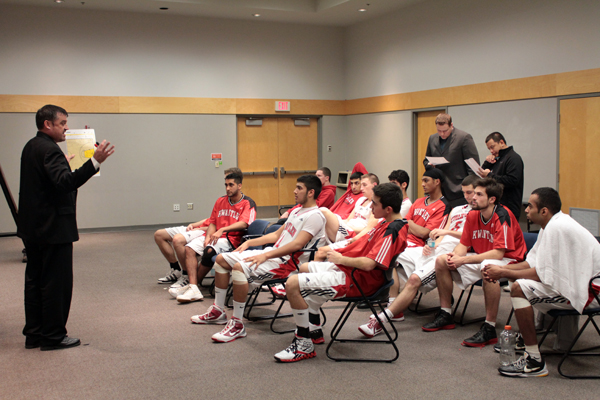
Coach Bernie Love gives him team a pep-talk right before their Feb. 4 game against the Quest Kermodes. (Photo by Josh Saggau)
The 2010-’11 basketball season will be the last for Bernie Love, the head coach of Kwantlen’s men’s team, who announced his resignation last week.
Love, who has coached the team for nine of the past 12 years, said his reasons for leaving were personal, and had nothing to do with the team’s poor record: He is moving to Trail to be closer to family.
“It wasn’t an easy decision. If I was not moving back there, then I would be back,” he said, explaining he had made up his mind several weeks ago.

Coach Bernie Love screams at his team during their Friday night game after the Kermodes came back to erase a huge lead. (Photo by Josh Saggau)
When Love broke the news to his team, he was met with an “expressionless” response.
“They’re a bit of a quieter group. Not a lot of them said anything,” he said. “Maybe when the season’s done, then the goodbyes will come.
“I think that the last Saturday night will probably be a little bit tough.”
According to guard Doug Meyers, the silent reaction on the team’s part may have been for less-obvious reasons.
“There’s definitely a player-coach tension. It may not show, it may not come out in front of the team, but guys talk: It’s just the nature of the game,” said the second-year student.
“The problem here that I have most with Bernie is there’s a lack of accountability and perceived caring on his part and it leads to the team.
“Things that come from the coach definitely effect what goes on on the floor. I’m not going to say that it’s 100 per cent the coach, that it’s 100 per cent the players, it’s definitely a combination.”
The Eagles have suffered through nothing but losses since late November, a combination of poor shots and missing links on the players’ part; a lack of accountability and cancelled practices on the coach’s, according to Meyers.
He said that while the Love gave him “a lot of confidence” to be able to grow as a player and reach his potential, he didn’t follow through with his high expectations for the team.
“Talk the talk, walk the walk. In my opinion, Bernie’s a talker. It sucks to say, I haven’t seen a lot of walking,” he said.
On a personal level, Meyers went through what the team as a whole is struggling with.
When he was in Grade 9, he knew he loved the game; he also recognized that he “sucked.” But he confronted his coach with the goal in mind to be the team’s star by Grade 12. He was playing on the provincial team by the end of high school.
“I understand what it takes to get to that level [and] I just haven’t seen it here,” Meyers said.
Despite the effects of the coach’s “negative undertones” on the team, according to Meyers, Love is able to acknowledge part of the tension and focus on the positive.
“There’s wins and there’s losses,” Love said. “Obviously we’d like to be doing a lot better than we are… I don’t call this a waste of a year at all.”

Love is moving on from coaching university level teams, but not necessarily from coaching in general: He may coach at the high school and junior high level in the Interior. (Photo by Josh Saggau)
Leadership Conference: More than learning to lead
January 30, 2011 by Hayley Woodin · 1 Comment
For $20 a piece, Kwantlen students paid to come in to university on Jan. 29 for a day full of speeches and workshops.
While some students may not think that attending the third annual Student Leadership Conference would be the ideal way to spend a Saturday, according to the opening keynote speaker Joel Hilchey, the eight hours worth of sessions and speakers provided students with valuable skills and opportunities.
“I think it’s a chance to connect with other students who are like-minded, and who are willing to think a little bit bigger about the world,” he said.
The university’s president Dr. David Atkinson spoke briefly to students before Hilchey gave his opening speech titled “Take The Risk!” Atkinson was a keynote speaker at the first two conferences.
Hilchey is a co-founder of The Beanstalk Project, an organization that empowers students to take on leadership roles within their schools and communities. He is also a member of the Canadian Associated of Professional Speakers. As a student, he didn’t attend many conferences, but recognized the importance of being involved.
“I think it’s probably different for everyone,” he said. “[But] of course people gain skills.”
As part of his presentation, Hilchey tested a willing (but nervous) student’s capability to overcome her fears. Andrea Danyluk bit the bullet and placed her hand on a fully-functioning mouse trap. The speaker said that conquering fear is the first hurdle students need to overcome. “They become aware of their own strengths and their own goals.” The conference gave students the chance to step outside of their comfort zones.
Students could choose between a wide variety of workshops, ranging from public speaking sessions to networking. Hilchey said not only are the classes beneficial, but in choosing which ones to attend, students begin to recognize in which areas they need improvement. “There’s value in the process of choosing what you want to do at that session,” he said.
“I think it’s special when you get a lot of people together, or even if it’s a smaller group. When people get together and kind of get outside of their daily routines, good things can happen,” he said. “I think I get the most meaning out of helping people connect with each other, because those connections are lasting.”
Privatization: A student’s perspective
January 17, 2011 by Hayley Woodin · Leave a Comment
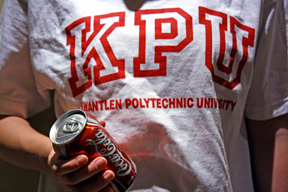
Coca-Cola, whose products are consumed 1.6 billion times a day, won the rights to be the sole provider of beverages at Kwantlen. (Photo by Hayley Woodin)
Kwantlen cafeteria food is the product of $7.7-billion food company Sodexo, Coca-Cola earned the rights to be “the sole provider of beverages” on campus and if students want to check out books, they can do so from one of four Coast Capital libraries.
Corporate entities are visible all throughout Kwantlen, but it may not be a bad thing.
For example, when “Ahh Giver” Coca-Cola entered into a multi-year agreement with the school, one condition of the contract was that the company would be required to provide annual funding for student and faculty projects and events.
Kwantlen also received $1 million from Coast Capital Savings credit union, the largest single donation ever received, according to the school.
Last semester, Eva Botten, co-founder of the former Kwantlen club Friends 4 Food, led a campus action day against corporate involvement before the group folded. The club provided healthy meal options for students in an effort to boycott the school’s food and drink corporatization.
Despite being against the idea behind privatization, Botten could still see the positive aspects.
“Ultimately it is our campus, and if students decide that we want a better library, better this, better that and we can’t raise funds to do it on our own, then sure, bring somebody in,” she said.
“But I think there should be a somewhat equal balance between student-led organizations and [company involvement].”
The fourth-year criminology student claimed the ends don’t always justify the means, and the concept of privatizing aspects of the university can, in the long run, be detrimental to student life.
“Almost every single building has its corporate entity to it, and I don’t know when it’s going to stop,” said the club’s former advocate and cook. “I think it means the total enclosure of student grounds.
“If we want to become more of a university, I think that [university] space should at least be available for students,” she said, adding that the paperwork process involved in setting up fundraisers or display tables on campus is a major deterrent for clubs such as Friends 4 Food.
“It’s completely going to crap,” she joked, adding, more seriously, that she believes no matter what, decisions “should always be in favour of the students”.
KSA council still hasn’t met since September
December 14, 2010 by Hayley Woodin · Leave a Comment
The Kwantlen Student Association council hasn’t met since September because they haven’t been able to meet quorum.
A sudden change in council chair that happened months ago left several council members unhappy because they were not consulted prior to the change.
Since then, some council members have been exercising their rights by not showing up for meetings.
Matt Todd, director of external affairs for the KSA executive board, said he has reason to believe council will be meeting soon.
The reason, he said, is that while some of the council members may still not be pleased about what happened, they felt as though they had made their point, and are now ready to move on.
But while part of council has been making their point, how has the lack of a student council this semester affected students?
The KSA doesn’t fall apart if council doesn’t meet, Todd said. It doesn’t rely on council to function on a day-to-day basis.
However, there are several items on the council’s agenda that have been postponed time and time again because they require council approval.
One of those items was the KSA budget approval to fund the 2011 Kwantlen Leadership Conference. If the event doesn’t receive the funding, it will ultimately have to be cancelled. But even then, there are provisions set up so that in the event council still doesn’t meet in January to pass the 2011 budget, it will essentially default to the same funding and expenditure decisions made in 2010.
And the KSA funded the Leadership Conference last year.
Other KSA projects that have been stalled include the official appointed of Melinda Bige to the role of Aboriginal Liaison. Bige assumed the position after the resignation of Roxanne Charles.
The KSA’s work on the multipass and developing a student health and transportation program have also been put on hold.
Best Buddies comes to Kwantlen
November 22, 2010 by Hayley Woodin · Leave a Comment
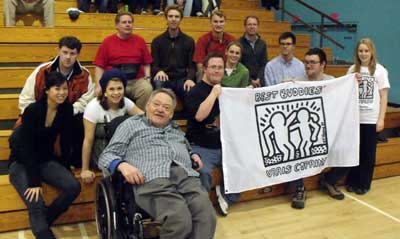
Students from the University of Victoria participate in their school's Best Buddies chapter. (Photo provided by Best Buddies)
A nation-wide charitable organization called Best Buddies fosters strong friendships between high school and university students, and individuals with intellectual disabilities has come to Kwantlen’s Richmond and Surrey campuses.
Students are matched up by chapter presidents to community residents who share interests, personalities and schedules. And the rest is pretty much left up to participants.
“It’s up to the students to make and develop their friendship as they want,” said Amy Lynn Taylor, the Western Canada program manager and current chapter president for the Surrey campus.
“We hope they are meeting as frequently as they’d like to,” she said, adding that students and their buddies are encouraged meet a minimum of twice a month.
Depending on the pair, time between students and their buddies is spent doing what the average young adult does: shopping, dining, movie-going and chatting.
Ora Chen, Richmond chapter president, spends most of her time with her buddy Winnie shopping at Richmond Centre.
“Our relationship is very good; she thinks I’m really a good friend, and she’s really good in our friendship,” Chen said.
While the chapter presidents generally host four group meetings each school year, the program is mainly meant to provide a safe and encouraging way for students to get involved in the communities around Kwantlen, and meet and interact with people outside of school who don’t necessarily have the same opportunities as they do.
Both chapters work closely with Community Living British Columbia, an organization that works with adults who have intellectual and developmental disabilities.
As Taylor explained, the community clients from CLBC genuinely appreciate being able to meet students, go out, have fun and spend time with people who enjoy spending time with them as well.
The Surrey and Richmond chapters are relatively new, and as there are currently more buddies than volunteers, both chapters are always seeking student participation.
Students can participate in either the Surrey or Richmond chapter for as long as they attend Kwantlen, or have the time to commit to the program. But even when schooling comes to an end, the friendships made between students and their buddies often don’t.
“In a lot of cases, they do continue to stay in touch,” Taylor said.
For more information on the program, visit www.bestbuddies.ca, or seek out the Best Buddies booth at the Kwantlen volunteer expo being held at the Surrey campus Nov. 23 from noon-5 p.m., and at the same time on Nov. 24 at the Richmond campus.
SFU to rally for education: Will Kwantlen?
November 7, 2010 by Hayley Woodin · 1 Comment
Simon Fraser University will host a student-led education rally Wednesday to protest funding cuts to universities and issues surrounding student debt.
The SFU Community Coalition aims to raise awareness about the current state of education funding in B.C., in the hopes of making post-secondary education a high priority in B.C.’s next provincial budget.
The Nov. 10 rally, scheduled for the Convocation Mall at 3 p.m., is an offspring of the Canadian Federation of Students’ student debt campaign, which focuses on similar issues and unites students in an attempt to induce legislative education reforms.
Unlike other universities across Canada, Kwantlen has yet to speak out about those issues.
“The KSA will have a campaign, it’s just a matter of to what extent students grasp it and to what extent we are able to use our capacities to the fullest in the KSA,” said Bradley Head, the KSA’s director of academic affairs, and the chair of the academic issues committee.
The capacity of the KSA is currently limited: internal politics have rendered council ineffective since the start of the fall semester, and there haven’t been any official meetings since September, according to Head.
“We’ve been in discussion with SFU a little bit, but not to the extent where we can do any big campaign,” he said.
Head said that the KSA would like to look into receiving more operating funds and grants for the university, increasing class sizes and making student loans more accessible.
These are similar to the issues being brought up on Wednesday on SFU, along with reducing student loan interest rates, and increasing funding to StudentAid B.C., a government program that helps students with the cost of post-secondary education.
The provincial budget will be finalized mid-November, so students have limited time to voice the changes they’d like to see in the 2011 budget.
But change is possible. And with Premier Gordon Campbell’s recent announcement that he will be resigning, there may be hope for increased funding towards education.
“I think that [with] the change in premier, there’s a lot of positive that could come from it for the school,” said Head.
“Depending on who is placed in that position, their opinions based on student debt and the way the education system’s currently funded, [it] could massively change any chances the student unions have of decreasing or maintaining current tuition,” Head speculated.
Head said he hopes the issue be brought up within the KSA in the next two to three weeks.
“[But] that’s if council meets,” he said. “If council doesn’t meet, there’s no way to actually do the campaign.”
‘Thirstday’ costume contest scarier than midterms
November 4, 2010 by Hayley Woodin · Leave a Comment
On Oct. 28, Kwantlen students and staff gathered in the Richmond campus rotunda for a THIRSTday Halloween costume contest. Hayley Woodin and Jeffrey Yip document the fifth annual spooky fashion show through video and photos.
Sustainability theme for World Food Day at Kwantlen
October 25, 2010 by Hayley Woodin · Leave a Comment
Sustainability was the theme for World Food Day 2010, and while the day has already come and gone, organizers have aimed to have a lasting impact.
On Monday Oct. 18, Kwantlen students and faculty took part in a free United Against Hunger event at the Langley campus.
In addition to food and cake, education was served up by numerous speakers that presented between 9 a.m. and 1:30 p.m.
Among the presenters were Dr. Deborah Henderson, Kwantlen’s Director of the Institute for Sustainable Horticulture, Dave Stark, the director of Langley Food First, and Langley Mayor Peter Fassbender.
The event was sponsored by the university, the Food and Agriculture Organization of the United Nations and the Food For Famine Society, a Langley-based company that sends a food supplement called Cibo to starving children overseas.
Kwantlen’s World Food Day focused on the importance of local sustainability, in keeping with the idea that hunger can be fought at international, national and regional levels. While the event was positive and meant to encourage local action, it did touch on the world’s current environmental situation, which was less than positive.
“Canada is really bad… needing four to six planets to keep our lifestyle alive,” Henderson said to attendees in the school’s auditorium.
The topics discussed included agricultural pollution, healthy living, food production and fair trade.
“It is a moral obligation to feed ourselves,” Henderson continued, before highlighting the benefits to producing food locally.
And, with regards to trade, “We’ve gone past the point that makes sense,” she said, noting that importing food that can be grown here is simply excessive.

